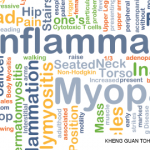Regarding cardiac-specific therapies, Dr. Zakaria clarified that no specific studies have tested these therapies in patients with autoimmune myopathies. If the patient has evidence of heart failure, his first-line treatment is diuretic therapy. If there is evidence of obstructive coronary artery disease, he refers patients for potential intervention.
After this, he considers therapies to treat heart failure, including angiotensin-converting enzyme (ACE) inhibitors or angiotensin receptor blocker (ARB) therapy.11 A beta blocker may also be prescribed to support favorable cardiac remodeling in a stable patient. Dr. Zakaria also recommended aldosterone antagonist therapy. If these therapies are ineffective, he moves to advanced therapy, including the consideration of ventricular assist devices, heart transplant or, more likely, palliative care.
Dr. Zakaria reiterated the value of diagnostics in identifying the extent of cardiac involvement when a patient with myositis is referred to a cardiologist. After the disease state and effects are understood, he stressed how close collaboration with the patient’s rheumatologist is critical to establishing therapies proven to increase cardiac function.
Carina Stanton is a freelance science journalist based in Denver.
References
- Diederichsen LP. Cardiovascular involvement in myositis. Curr Opin Rheumatol. 2017 Nov;29(6):598–603.
- Schwartz T, Diederichsen LP, Lundberg IE, et al. Cardiac involvement in adult and juvenile idiopathic inflammatory myopathies. RMD Open. 2016 Sep 27;2(2):e000291.
- Diederichsen LP, Diederichsen AC, Simonsen JA, et al. Traditional cardiovascular risk factors and coronary artery calcification in adults with polymyositis and dermatomyositis: A Danish multi-center study. Arthritis Care Res (Hoboken). 2015 May;67(6):848–854.
- Rosenbohm A, Buckert D, Gerischer N, et al. Early diagnosis of cardiac involvement in idiopathic inflammatory myopathy by cardiac magnetic resonance tomography. J Neurol. 2015;262(4):949–956.
- Huber AT, Bravetti M, Lamy J, et al. Non-invasive differentiation of idiopathic inflammatory myopathy with cardiac involvement from acute viral myocarditis using cardiovascular magnetic resonance imaging T1 and T2 mapping.J Cardiovasc Magn Reson. 2018 Feb 12;20:11.
- Xu, Y., Sun, J., Wan, K.et al. Multiparametric cardiovascular magnetic resonance characteristics and dynamic changes in myocardial and skeletal muscles in idiopathic inflammatory cardiomyopathy. J Cardiovasc Magn Reson. 2020 Apr 9;
- Caforio ALP, Adler Y, Agostini C, et al. Diagnosis and management of myocardial involvement in systemic immune-mediated diseases: A position statement of the European Society of Cardiology Working Group on Myocardial and Pericardial Disease. Eur Heart J. 2017 Sep 14;38(35):2649–2662.
- Wang CS, FitzGerald JM, Schulzer M, et al. Does this dyspneic patient in the emergency department have congestive heart failure? JAMA. 2005 Oct 19;294(15):1944–1956.
- Sharma K, Orbai AM, Desai D, et al. Brief report: Antisynthetase syndrome-associated myocarditis. J Card Fail. 2014 Dec;20(12):939–945.
- Yancy CW, Jessup M, Bozkurt B, et al. 2017 ACC/AHA/HFSA focused update of the 2013 ACCF/AHA Guideline for the Management of Heart Failure: A report of the American College of Cardiology/American Heart Association task force on Clinical Practice Guidelines and the Heart Failure Society of America. J Am Coll Cardiol. 2017 Aug 8;70(6):776–803.

